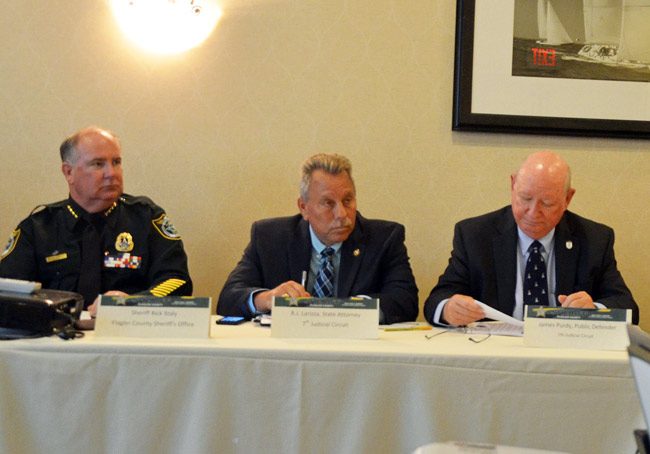
There will be no de-criminalization of marijuana possession in Flagler County in any form.
The Flagler County Commission on Monday killed that ember of a proposal outright, claiming cops don’t want it so it shouldn’t happen. But commissioners were somewhat more indulgent toward medical marijuana dispensaries, with even two commissioners who’d wanted them banned from the county joining two more liberal voices on the board to agree to zoning rules that will make them permissible in commercial and industrial zones.
The decriminalization proposal was put forth by former County Commissioner Barbara Revels and former Flagler County Sheriff Jim Manfre in January 2017, through the Public Safety Coordinating Council, a board representing local law enforcement, the judiciary, local government and social services. It had taken Revels and Manfre seven months to win the council’s recommendation that a de-criminalization process be put in place, but the proposal had to be approved by the County Commission, and if it were to be enacted in the cities, it would also have to be approved by each city commission.
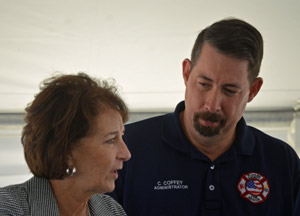
Manfre and Revels are Democrats. They were voted out—Manfre in a primary later in August, Revels that November—and replaced by Republicans: Dave Sullivan on the County Commission, and Rick Staly as sheriff. Sullivan is so extreme on all matters marijuana that he wanted to go as far as banning any medical pot dispensaries. Staly is not interested in a de-criminalizing approach, nor are Tom Foster and Matt Doughney, the police chiefs in Bunnell and Flagler Beach.
“Now we’ve got a new board,” Coffey said, “we’ve got three new members that are here today and we’ve got basically every law enforcement official in the county saying we’re not really interested in doing this unless it’s part of a state overall program, and so it may make going forward kind of moot as far as going forward.” And with that hail of ice picks on the proposal, Coffey asked his commissioners: “The question before you is whether we should go forward.”
He didn’t have to ask, though the two commissioners most opposed to the idea quickly jumped in. “I side with law enforcement, I don’t think we should go forward,” Greg Hansen said.
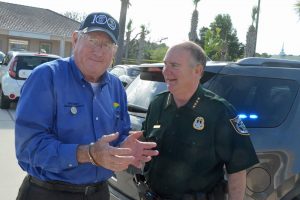
But even Donald O’Brien, the commissioner most inclined toward pot’s 21st century evolutions, particularly regarding the punishing effects of criminalization on young people’s lives, job and school prospects, had retreated. “I thought it was a direction to go in with respect to not hurting folks that maybe had a minor offense when they were young, a youthful kind of situation,” O’Brien said, “but in rethinking it, listening to the points of law enforcement and just some other issues, I would also support that we not move forward with the civil citations at this point, again, given the fact that we would have surrounding jurisdictions that are not doing that, and law enforcement that doesn’t see it as a tool they’d want to use.” He said if it would work, it would only be at the discretion of the law enforcement officer at the point, though that’s actually the way the ordinance is worded.
For now, Jack Bisland, the undersheriff, said if deputies make an arrest for possession of less than 20 ounces of marijuana (a joint is a tiny fraction of that), the officer either makes a physical arrest, with jail, or issues a notice to appear in court without booking the individual in jail. Either way, the criminal process is started, even if the State Attorney’s office drops the charges: the record is created.
“But one of the options still today would be to still not charge the person,” Sullivan said.
“That’s always been an option,” Coffey said.
“So to a degree a lot of what we’re recommending here, in a way, already exists,” Sullivan said—again displaying a misunderstanding of the intent of the proposed ordinance, which was to prevent an arrest from staining a young person’s record.
“Well, this would have codified it and would have also brought in other things,” including other misdemeanors, O’Brien said.
Only Sally Sherman, the deputy administrator, mentioned that the ordinance enabled the prevention of an arrest record, but no one heard her. Nate McLaughlin, the commission chairman who had supported the de-criminalization throughout, and now chairs the public safety coordinating council, spoke with his silence: he knew the battle lost. And just like that, in a matter of 10 minutes, the commission killed what had been an effort going back to January 2016—and one several other counties in Florida have embraced, as have entire states.
Then they turned to medical marijuana.
Last November’s constitutional amendment referendum opened the way to medical pot, and dispensaries are opening across Florida. Local governments, including the county, have prevented them from opening through moratoriums, claiming they needed time to figure out how state law and regulations would shake out. The law is simple: local governments may either ban dispensaries outright, or allow them in the same manner as pharmacies are allowed. After some wrangling, that’s the direction Flagler Beach is going—to allow them on the mainland side of the city (there are no pharmacies on beach side), and to zone out pharmacies beach-side from now on, thereby also zoning out dispensaries. Palm Coast is adopting a similarly regulated approach, allowing dispensaries along its main commercial roads such as State Road 100, Palm Coast Parkway and Old Kings Road.
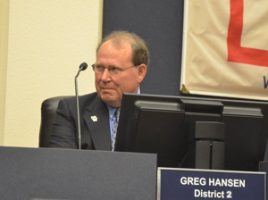
“We have no pharmacies in unincorporated Flagler County anywhere,” Coffey said, “and if Palm Coast adopts anything or Flagler Beach adopts anything, which both look like they’re going to, chances are we likely will not have any pharmacies still in Flagler County, because we just aren’t in the right location to support a pharmacy or necessarily a medical marijuana dispensing facility.” The parcels that do fit the zoning in the west are so small that it would be almost impossible to develop them into commercially viable sites, Sherman said. Coffey later added: “This could be a Seinfeld episode, this could be a show about nothing.”
The commission meeting had its Seinfeldian moments, but for the wrong reasons.
Adam Mengel, the planning director, presented the proposal with a brief explanation of the law and regulations so far, noting that sales tax will not be collected on medical marijuana (just as no such tax is collected on medicines.)
A physician “certification” rather than a “prescription” is issued for 370 days’ worth of marijuana, so strictly speaking it’s not a prescription for medicines, though that appears to me more political legalese than bottom-line reality: as far as consumers are concerned, and as far as the constitutional amendment is concerned, it is medical marijuana, and the certification has the same effect as a prescription: it legitimizes or legalizes the possession of the product.
In medical marijuana facilities, employees must be 21 or older, pass a background test, and, as Mengle went on, “maybe that’s a little funny here on the next one, alcohol and drug-free workplace has to be in place.” A couple of commissioners chuckled, though none of them would—or should—be chuckling if they were hearing a presentation on workplaces that produce any other kind of prescription drug, or beer, or whiskey, and have similar restrictions (as all such workplaces do). It’s not clear why they chuckled with regards to medical pot’s workplaces.
Mengle’s aside and the chuckles may not have amounted to much, but they may reflect a persistent, underhanded derision toward the process surrounding medical marijuana—derision that has informed, and more often misinformed, commissioners’ decisions on larger questions, as it did even on Monday. (Mengle stressed at one point that the proposed ordinance is not intended to “zone out” the businesses, because the businesses are not considered nefarious.) And facilities that will grow marijuana may not be zoned out regardless, he said.
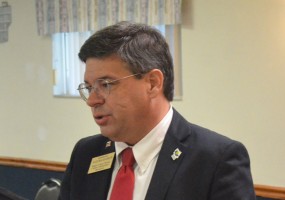
McLaughlin went on: “I think the citizens of this community have made it perfectly clear what they feel about this product, overwhelmingly supported this idea,” he said. “I think C1 is too limiting, and to me it would come off disingenuous to those voters who have made it clear, 71 percent, 72 percent of the Flagler County voters said this is a medical option that people want. This is how I view it, I don’t get caught up in the idea of whether it’s marijuana or opioids. There’s a lot of things that need a lot of attention from the state level and the medical community at large, but again, when this first came to us, I looked at this purely from a medical standpoint and the relief that it can bring.”
The county administration’s proposal is still significantly restrictive, he said, but still allows for options. “Nothing is going to be a pot shop. This is medical—”
Sullivan interrupted McLaughlin, not even letting him finish his thought.
“Not medical. It’s not medical,” Sullivan said, again incorrectly, “it’s not defined as medicine.” The constitutional amendment defined it specifically, of course, as “medical marijuana.” So does the Florida Department of Health’s regulatory language. Sullivan then got uncharacteristically rude, repeatedly interrupting McLaughlin to dispute McLaughlin’s wording, at one point flat-out calling him “wrong.”
Sullivan may have been partially right in only one regard, though he was splitting hair without explaining it to McLaughlin: the commission chairman was perhaps referring to medical marijuana “treatment centers” when he meant “dispensaries.” But there are treatment centers, and their mission is very similar to that of dispensaries—they do dispense—except that they may also cultivate and process the product—and Flagler County may well end up with such treatment centers. Those centers may also provide 24-hour delivery of products to patients. And McLaughlin was correct when he referred to “these medical marijuana treatment centers that the voters have passed and agreed to.”
When Sullivan finally allowed McLaughlin to complete his thought, McLaughlin’s proposal that the administration’s recommendation be adopted—including both commercial zones as fit for dispensaries—won out.
“I reluctantly agree,” Sullivan said. Hansen, who had attempted to ban dispensaries before, was also in agreement now.
The administration will redraft the ordinance accordingly, and submit it for ratification at public hearings later this month or in November, assuming Coffey does not sit on it for 13 months.





























Wishful thinking says
Flagler Sheriff doesn’t care about wasting our tax dollars on more costly stupid pot arrests.. . More deputys.. ..more cars
More beds in jail etc… at same time however allow businesses open 24 hours complete with alarms, and glaring lights just 50 feet from homes where they are not wanted.. not needed nor are not necessary nor compatible with any needs or wants of those close by residents. 100 years without a pharmacy but now we need a dispensary in front of our homes
FLAGLER County has gone mad!!!
John dolan says
These Draconian ideas are too misinformed to be taken seriously. The Rife of the Shire needs to stop with the cram it down our throat with a billy club mentality. You wont be there next election. Coffey get a plan and do what the voters decided.
Cheech says
Why would they do away with their bread and butter. All they have to do is say they smell marijuana in order to search your car or person. Its a governmental mafia, that’s all it really is.
Dave says
Disgusting! OUTRAGEOUS! poor excuse of leadership! It’s a sad sad day when these police think it’s ok to force their beliefs on the very people who own them, STOP RUINING OUR CHILDREN’S LIVES FOR POT, STOP USING POT AS A GATEWAY TO JUSTIFY PROFILING , FIND ANOTHER WAY TO CATCH REAL CRIMINALS AND LEAVE US THE HELL ALONE
Sw says
Stone age politics and I dont agree with it. Vast majority want Pot legalized. This is not you alls decision its the mandate of the people and inevitabke get over it.
Anonymous says
If pot was legalized in Flagler County alone and none of the surrounding counties legalized it, then Flagler County would become the Mecca of pot ln Florida and every pot smoker would want to MIGRATE here to live and stay high with out the threat of prosecution. If that is OK with the average citizen then go for it, but I am moving out.
Gkimp says
Good call!
Sw says
@Anon not the County the State of Florida
Wishful Thinking says
Nate – the voters never approved 50 pages of regulations requiring the dispensaries to be open 24 hours – to be fully alarmed with bright lights from dusk to dawn within 50 feet of homes – nor in an area where BARS are currently allowed – Nightclubs, ADULT Congregate facilities .
Nate – you are not a DOCTOR who can provide a medical opinion or base your opinion on such. You are an ELECTED official who represent the thousands of PEOPLE who pay your salary and that includes the over 100 people who live abutting a C-2 10 acre parcel in your district .
Nate – Where did you get your LAW degree to have the nerve to say that the people ( none of whom has contacted you) voted for WHERE they wanted these dispensaries available? Who contacted you that they even NEEDED hem personally within waling distance from their adjacent homes?
Nate – you even talk about what you plan to do ‘next year’. God forbid we are stuck with you another year.
You found your profession -number 1 ribbon cutter in Flagler County – that’s about the only thing you seem to be good at – in my opinion.
Too bad some of our uncaring officials ‘t have the brains that they do in Colorado, Washington…. You and Staley should get together – or he will have his deputies sitting outside all these dispensaries licking their chops to make any arrest they can think of
Amen for today – tomorrow is another day – can’t wait to see what is coming next..